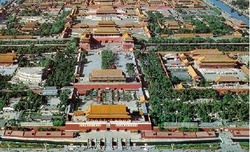Think of this as Volume 11, Number 45 of A-Clue.com, the online newsletter I’ve written since 1997. Enjoy.
China’s 4 trillion yuan stimulus program may turn out to be the most important story of this year.
How much is that? It’s one-sixth of the country’s GDP last year. The equivalent figure for the U.S. would be something like $2.2 trillion. It’s nearly what the Iraq war’s harshest critics say was spent there, by us, over this decade.
What will China get for its $586 billion? It will get new railways and subways. It will rebuild Sichuan after the earthquake. And it will stimulate demand.
Stimulating domestic demand, importing raw materials and putting money into job-seekers’ pockets all around the country, is what the New Deal of FDR was all about. The difference was that FDR’s New Deal didn’t really do a whole lot of this. They didn’t spend a lot.
This program is more on the order of what Hitler did in Germany, around the same time. Only it’s not going into swords — or not much of it is. It’s going into plowshares. And that’s important.
The main thing this program will do is help grow the Chinese middle class, outward from its base in manufacturing, into other areas like construction and civil engineering. From there the money will flow outward further still, creating new demands for Chinese-made goods, for education, and for medical technology. Yes, this is also very very good news for Sheldon Adelson. Will it save him? Who cares?
There are tremendous opportunities here for American civil engineers
and civil engineering companies, for American doctors and health
companies, for American educators and researchers. China may not be
able to comfortably supply this demand for talent from its own ranks.
Partnerships, correctly applied, can help reduce our trade deficit and
stabilize the whole globe.
This is the right move. It makes China an engine for demand, not just
supply, and helps balance out its economy. It gives more people a stake
in China’s society, without destabilizing the country. It will increase
Chinese imports. (Picture from Clemson University.)
It will take great wisdom to take full advantage of all this. But it
does somewhat lessen the pressure on U.S. policymakers to print more
dollars, and to stimulate our own demand. It could allow us to grow in
a more balanced way ourselves, give us the breathing space we need.
The past trade relationships between our countries have been terribly
dysfunctional. We could not continue in this way, them just exporting,
us just importing, and the dollar-yuan traffic all going one way.
The world may be improving in important ways. Let’s hope so.











